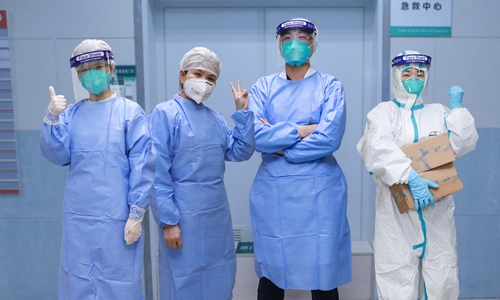HOME >> OPINION
As with Ebola, China will contain the novel coronavirus
By Joyce Chimbi Source:Global Times Published: 2020/2/9 20:13:40

Health workers (L-R) Bai Hui, Li Chunfang, Zhao Zhigang and Guo Qin, who have recovered from recent novel coronavirus infections, pose for a group photo at the emergency medical center of Zhongnan Hospital of Wuhan University in Wuhan, central China's Hubei Province, Feb. 6, 2020. (Photo by Gong Yong/Xinhua)
China was among the first countries to respond to West Africa's Ebola outbreak back in 2014, at a time when the Ebola virus had threatened to, for the first time, break out of the African continent and into the world. The scenario then draws uncanny parallels with the novel coronavirus today.
When, in 2014, the Ebola virus threatened to bring the West African region to its knees, China joined forces with the US to form a trilateral cooperation with Africa. The concerted efforts were geared toward combating the deadly Ebola virus. The unprecedented health cooperation between the two major powers spanned over two years, 2014 and 2015.
Using their funds, personnel and expertise to combat a disease that was getting out of hand with an average case fatality rate of 50 percent, the US and China led a highly effective global health intervention against Ebola.
This cooperation was highly critical because the 2014-16 period of Ebola outbreak in West Africa was the largest and deadliest since the Ebola virus was first discovered in 1976.
Today, China finds itself in the crosshairs of a deadly virus, the novel coronavirus. Chinese President Xi Jinping has termed the outbreak "a major test of China's system and capacity for governance."
The similarities between Ebola and the novel coronavirus cannot be overlooked and neighboring countries remain on high alert.
In true Chinese fashion, very assertive and deliberate efforts are ongoing to contain the virus whose epicenter is Wuhan, capital of Central China's Hubei Province.
In an epidemiological twist of fate, while Ebola had little means of transmission as one could only transmit it through close contact of bodily fluids such as blood and sweat, the coronavirus can pass between people with ease even before symptoms begin to show.
China has proved itself time and time again. Although this could be its most daunting health crisis in recent times, many believe it will not be any different this time.
As was the case during the Ebola virus in Africa, China will rise to the occasion. Importantly, China's health system is far from fragile.
Chinese health authorities disclosed on February 4 that the current fatality rate of the novel coronavirus infection on the Chinese mainland has dropped from 2.3 percent since the outbreak, to 2.1 percent. The World Health Organization's Director-General Tedros Adhanom Ghebreyesus has praised China for its handling of the outbreak.
China has already agreed to allow global health experts into the country to join forces with its own health experts to work out a solution.
In 10 days, China completed a quarantine hospital with a capacity for 1,000 patients in Wuhan, where coronavirus was first detected. The hospital, named Huoshenshan, has been put into use with an estimated 1,400 military medical workers on call.
Huoshenshan hospital is the first of two coronavirus quarantine hospitals. The second hospital, also in Wuhan, is called Leishenshan and is ready to accept patients with a capacity of 1,600 beds.
As with Ebola, Chinese experts are now focusing on a two-pronged strategy — early detection and early isolation. By isolating people already infected, this also serves to isolate the virus.
While the task ahead seems daunting, China has the financial and technical muscle to adopt a more aggressive approach to the outbreak of novel coronavirus.
At the height of the Ebola crisis and in an assertive show of solidarity, China trained at least 10,000 Ebola medical staff for West Africa where the deadly virus was concentrated. This crisis significantly highlighted the lengths to which China will go to address a public health emergency of a global scale and magnitude.
China responded swiftly and proactively to the West African epidemic. There is no doubt that this key global player will do the same to contain coronavirus.
To improve disease surveillance in the wake of the Ebola virus, China was very instrumental in the development of the Africa Centers for Disease Control and Prevention.
As all eyes remain firmly on China to take the lead in combating the coronavirus, there is growing confidence that it is only a matter of time before this outbreak is brought under control. There is further confidence that with the backing of the international community, China has what it takes to eliminate and eradicate the coronavirus.
The author is a Kenya-based journalist. opinion@globaltimes.com.cn
RELATED ARTICLES:
Posted in: ASIAN REVIEW